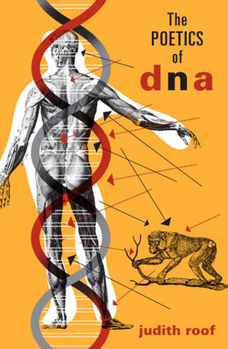The Poetics of DNA: Volume 2
How has DNA come to be seen as a cosmic truth, representative of all life, potential for all cures, repository for all identity, and end to all stories? In The Poetics of DNA, Judith Roof examines the rise of this powerful symbol and the implications of its ascendancy for the ways we think--about ourselves, about one another, and about the universe. Descriptions of DNA, Roof argues, have distorted ideas and transformed nucleic acid...
Format:Paperback
Language:English
ISBN:0816649987
ISBN13:9780816649983
Release Date:June 2007
Publisher:University of Minnesota Press
Length:248 Pages
Weight:0.75 lbs.
Dimensions:0.6" x 6.1" x 8.9"
Customer Reviews
1 rating
she tirelessly demonstrates the problematic logic that undergirds today's assumptions about DNA
Published by Thriftbooks.com User , 17 years ago
In The Poetics of DNA, literary scholar Judith Roof questions both why and how DNA has come to symbolize "a cosmic truth, representative of all life, residence of all answers, potential for all cures, [and] repository for all identity." DNA has been regarded as an unquestionable truth, but, as Roof rightly observes, this particular discourse about the infallibility DNA is far from objective. Like all discourse, the linguistic representation of DNA is equally dependent upon and limited by language, which is, in turn, structured by the various cultures and ideologies that use it. This book is a study not only of the poetics of DNA, but of the implications of its poetics -- its linguistic representations -- and of its appropriations. Cultural and ideological appropriations of DNA occur linguistically through the use of tropes such as metaphor, metonymy, and analogy. Roof analyzes these misappropriations in her chapter "The Homunculus and Saturating Tales." She convincingly argues that conservative ideologies concerning gender, sexuality and race have preserved themselves by utilizing current scientific research on DNA and the gene in particular. Roof describes how the harnessing of this "scientific evidence" effectively reinforces cultural stereotypes. On gender, for instance, Roof states that "What the scientists observe may well be true, but the ways it is characterized are all about ideology -- an ideology seemingly naturalized by science -- but which deploys gender stereotypes as a starting point. These stereotypes, however, are also comforting, since they provide a familiar cultural logic for the "behaviors" of genes, which reinforces older notions of gender that have recently come into question. If we are worried that women are too much like men as a result of successful feminist movements and the reform of laws, then what better way to reassert a more conservative, patriarchal notion of the "proper woman's place" than to claim that male and female genes behave according to older patterns?" Roof's juxtaposes this discussion about gender to ones about sexuality and race. Her section on the controversy surrounding the possible existence of a "gay gene," while quite brief, is smart and provocative. Throughout her study she tirelessly demonstrates the problematic logic that undergirds today's assumptions about DNA and the power afforded to the sciences as a result. The Poetics of DNA is a testament of the value of the humanities in today's science - and technology-driven world. While the humanities are overlooked -- and underfunded -- in favor of the sciences, Roof reminds us of their worth.





